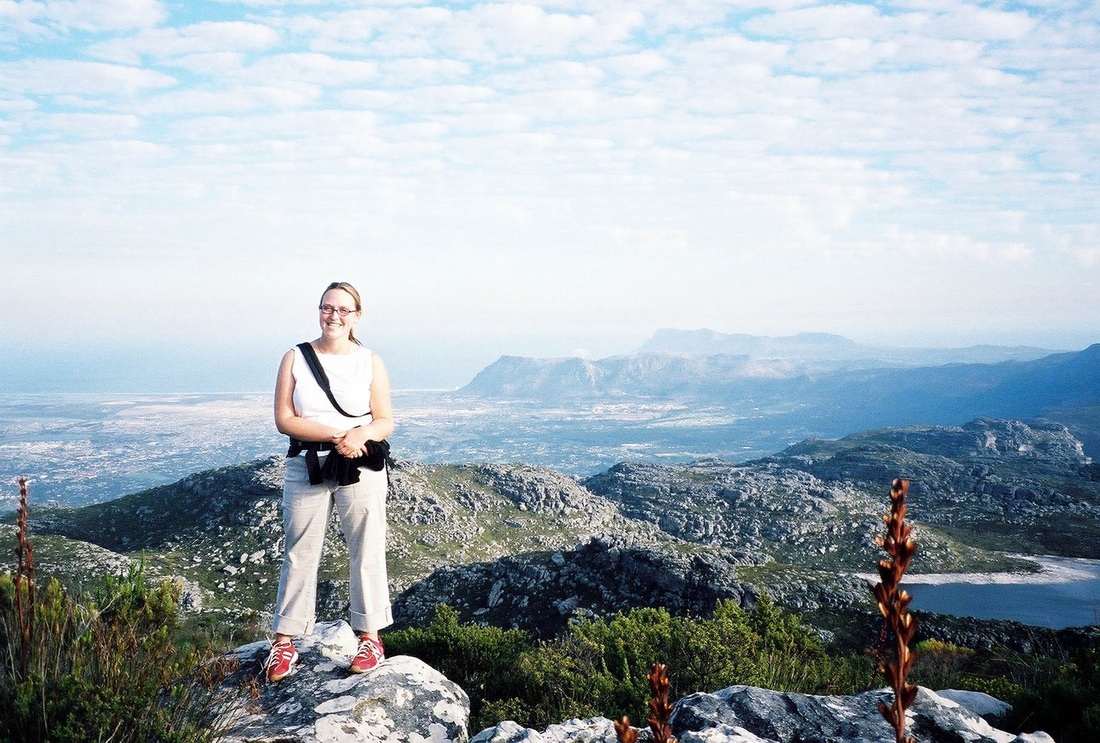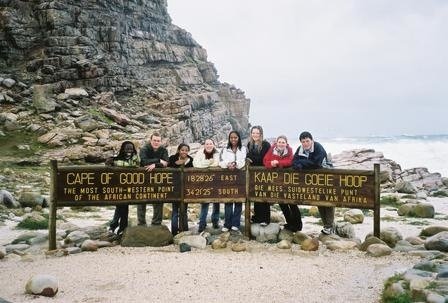|
Our last day in Cape Town and I’m left noticing all the things I will miss about this city,this country, this experience: the smells of African spices; the musical welcomes everywhere we go; all of the South African children who are eager to talk to and hug us; finding an excuse to say “yebo” as much as possible each day; the animals who pop up in unexpected places (cows wandering the townships, geckos falling on me in the shower, wildebeest roaming a field in the middle of Cape Town); Table Mountain magnificently orienting us to infinite bays and neighborhoods; our own students finding song mid-way through the trip and then peppering each day with selections from The Lion King and The Prince of BelAir. Just about the only thing Iwon’t miss is pap, a cornmeal mush that’s been served to us a few too many times. I had grand plans of spending my last half-day in South Africa doing something new and exciting (abseiling down Table Mountain? visiting the District Six museum? running along the beach to Clifton?), but Hammer and I have succumbed to the V&A Waterfront, a megaplex of malls and restaurants lining Cape Town’s working harbor. We are spending our last few hours in a harried attempt to finish some shopping (gifts to bring home! thank you cards for Timothy and Paul! dried guava for the plane ride!)…as if we haven’t bought enough already. I’ve been amazed throughout the trip that we can go from experiences like Mama Amelia’s—where Anathi (one of the 94 kids living at Sakhumzi) informed me, We don’t have our own things; we share everything. I’ve never even owned my own watch or shoes”—to dropping hundreds of dollars at markets and upscale hotels. It’s not that I feel guilty for our sometimes extravagance (although our consumerism definitely marks us as Americans…Timothy even remarked at some point, “Oh man, you lot can shop!”), but I guess I’m still trying to figure out what our being here has done, for us as well as the people we’ve met and visited. Opening our eyes has been thrown around a lot, but did we really need to come halfway around the world to open our eyes to inequality and poverty and struggle? I know I didn’t…these are things I’m all too aware of at home. And are our school supplies really going to have a huge effect on the lives of the people we met? The kids at Bongani can color pictures now, but in the grand scheme of things…What have we really accomplished by being here? How have we changed? More importantly, what have we learned? This is the lesson that I’ll take home with me: that in the face of even the most wretched living conditions or unjust political oppression, it is possible—no, necessary—to hope. And that although the roof may be leaking and shoes may be worn out (or worse: epidemics may be encroaching and jobs may be missing), we can still lead happy and meaningful lives, lives worth living. And if we hope for more, and if we act on that hope, things just might change. 1994 taught South Africa just that: hope and faith changed their world. South Africa definitely still has its share of political and economic issues to address (the shanties of Kayelitsha and the ravage of AIDS attest to that), but what is so remarkable is that South Africans remain hopeful and optimistic. Maybe it’s ubuntu, the Zulu idea that “I exist because you exist,” the idea that we are in this together and we can make it if we work together. Or maybe it’s the sense that the impossible has already happened—apartheid ended!—and that the world can only continue to get better (I’m still astounded by the minister at St. Paul’s in Soweto, who declared in his sermon, “In 1994, God kept his promise to us, to Soweto”). Or maybe it’s South Africa itself: when you are blessed with a home as geographically stunning and vibrant as southern Africa, how can you not believe that the life of humans must someday equal the beauty of the landscape? Or maybe it’s simply what Mama Amelia knows and shares with her 94 children at Sakhumzi: that it is hope, love, and joy that make life worth living. It is not my gifts and purchases—not even my beautiful Xhosa skirt with the bustle—that are the important things I’m bringing home from South Africa. In fact, they have nothing to do with the South Africa I’m falling in love with. In a week, a year, or even when I’m eighty, this is what I’ll remember about these past two weeks: Louis’s smile when he talks about his vision for South Africa’s future. Anathi’s genuine tenderness for me, a complete stranger. The joyful rhythms of the drum song at the Africa Café. Timothy’s tears when hearing the new South African national anthem in a school for the first time (“When I was in school, we used to lower the flag to the floor and have a moment of silence,” he said). The exuberant song we received as a welcome at St. Paul’s. Hammer’s wonder at the marvels of each day. And this is the image that will stay with me: Standing at the Cape of Good with my thirteen other LFA travelers and feeling a bit prophetic—knowing the future in store for South Africa when Diaz stumbled upon this end of the world in 1488 and marveling at the miraculous nation that managed to emerge half a century later. Of course the Cape of Storms became the Cape of Good Hope, and of course it’s hope I’m taking home with me…you can’t leave this place with anything else.
0 Comments
Leave a Reply. |
AboutWhile living in Mexico, I joked that speaking Spanish forced me to be far more Zen about life: Since I could only speak in the present tense, I was forced to just live in that present tense. Archives
June 2023
Categories
All
photosLike what you see? That's mostly Ross Freshwater. Check out my talented partner-in-life's photo gallery. |


 RSS Feed
RSS Feed